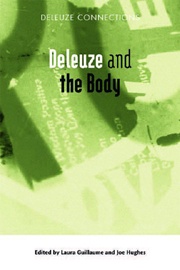Book contents
- Frontmatter
- Contents
- Introduction: Pity the Meat?: Deleuze and the Body
- DELEUZISM
- 1 Time and Autopoiesis: The Organism Has No Future
- 2 Larval Subjects, Autonomous Systems and E. Coli Chemotaxis
- 3 Bodies of Learning
- 4 Believing in the World: Toward an Ethics of Form
- 5 Matter as Simulacrum; Thought as Phantasm; Body as Event
- PRACTICAL DELEUZISM
- Notes on Contributors
- Index
1 - Time and Autopoiesis: The Organism Has No Future
from DELEUZISM
Published online by Cambridge University Press: 12 September 2012
- Frontmatter
- Contents
- Introduction: Pity the Meat?: Deleuze and the Body
- DELEUZISM
- 1 Time and Autopoiesis: The Organism Has No Future
- 2 Larval Subjects, Autonomous Systems and E. Coli Chemotaxis
- 3 Bodies of Learning
- 4 Believing in the World: Toward an Ethics of Form
- 5 Matter as Simulacrum; Thought as Phantasm; Body as Event
- PRACTICAL DELEUZISM
- Notes on Contributors
- Index
Summary
There was a critical scene that was narrated frequently in the theoryfrenzied years of the 1980s, operating as an often-invoked tableau that would awaken us from our literalist slumbers. The child faces the mirror, jubilantly rejoicing in the image of his unity (Lacan 1977). This scene captured the predicament of misrecognition: the self is not the naturally bounded organism (a thing within the world), but a site of desires, relations, drives, fantasies and projections that cannot possess the coherence of a body. There is a radical disjunction between the subject, who is nothing more than an effect of its relation to an other whom it cannot read, and the self, ego or individual that we imagine ourselves to be. It is the body as bounded organism, centred on a looking face whose gaze can be returned by the mirror, that not only represses the chaotically dispersed and relational manner of our existence; it also operates as a figure of reading. We read other bodies as though they harboured a sense or interior meaning that might be disclosed through communication, and we read texts as though they operated like bodies – as well-formed wholes possessing a systemic logic the sense of which might become apparent (Felman 1987).
In this respect the Lacanian notion of Imaginary méconnaissance – where we live the decentred and dispersed incoherence of the symbolic order as some illusory whole – repeats a criticism of the organism that goes as back as far (at least) as Husserlian phenomenology.
- Type
- Chapter
- Information
- Deleuze and the Body , pp. 9 - 28Publisher: Edinburgh University PressPrint publication year: 2011



